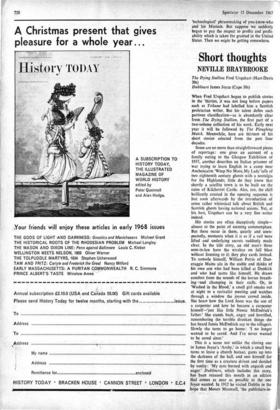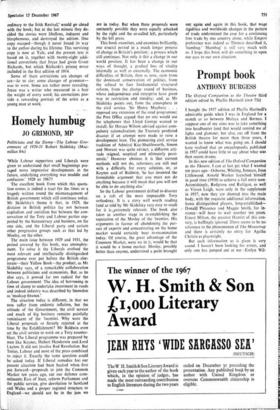Short thoughts
NEVILLE BRAYBROOKE
The Dying Stallion Fred Urquhart (Hart-Davis 30s) Dubliners James Joyce (Cape 30s) When Fred Urquhart began to publish stories in the 'thirties, it was not long before papers such as Tribune had labelled him a Scottish proletarian writer. But his talent defies such partisan classification—as is abundantly clear from The Dying Stallion, the first part of a two-volume collection of his work. Early next year it will be followed by The Ploughing Match. Meanwhile, here are thirteen of his short stories selected from the past four decades.
Some are no more than straightforward pieces of reportage: one gives an account of a family outing to the Glasgow Exhibition of 1937, another describes an Italian prisoner of war trying to learn English in a camp near Auchencairn. 'Weep No More, My Lady' tells of two eighteenth century ghosts with a nostalgia for the Highlands; little do they know that shortly a satellite town is to be built on the ruins of Kilcheviot Castle. Alas, too, the chill brilliantly created in the opening sequence is lost soon afterwards by the introduction of some rather whimsical talk about British and Scottish ghosts having national unions. Yet, at his best, Urquhart can be a very fine writer indeed.
His stories are often deceptively simple— almost to the point of seeming commonplace. But there occur in them, quietly and unex- pectedly, moments when it is as if a veil were lifted and underlying secrets suddenly made clear. In the title story, an old man's three sons-in-law have the wireless on full blast without listening to it; they play cards instead. To console himself, William Petrie of Dun- craggie Mains sits in the stable and thinks of his own son who had been killed at Dunkirk and who had tastes like himself. He draws comfort from the sounds of the horses breath- ing -'and champing in their stalls. Or, in 'Washed in the Blood,' a small girl sneaks out at night to a revivalist meeting and watches through a window the joyous crowd inside. She hears how the Lord Jesus was the son of a carpenter and how he became a carpenter himself—'just like little Nessie McEndrick's father.' She stands back, angry and horrified, remembering the terrible drunken things she has heard Jamie McEndrick say to the villagers. Slowly she turns to go home : 'I no longer wanted to be saved. And I've never wanted to be saved since.'
This is a scene not unlike the closing one in James Joyce's 'Araby,' in which a small boy turns to leave a church bazaar, gazes up into the darkness of the hall, and sees himself for the first time as a creature driven and derided by vanity: 'My eyes burned with anguish and anger.' Dubliners, which includes this story, has been reissued this month in an edition that comes as near as possible to the one Joyce wanted. In 1912 he visited Dublin in the hope that Messrs Maunsell, 'the publishers-in-
ordinary to the Irish Revival,' would go ahead with the book; but at the last minute they de-- tided the stories were libellous, indecent and blasphemous, and destroyed the edition. One copy escaped—though it never found its way to the author during his lifetime. This surviving copy is now at Yale, and the present text is based on it, together with twenty-eight addi- tional corrections that Joyce had given Grant Richards, but which Richards's printeg never included in the first edition of 1914.
Some of these corrections are changes of sex—he to she; some changes of grammar was to were. Some are rather more revealing. Joyce was a writer who measured to a hair the weight of every word; his corrections pro- vide a rewarding portrait of the artist as a young man at work.



































 Previous page
Previous page